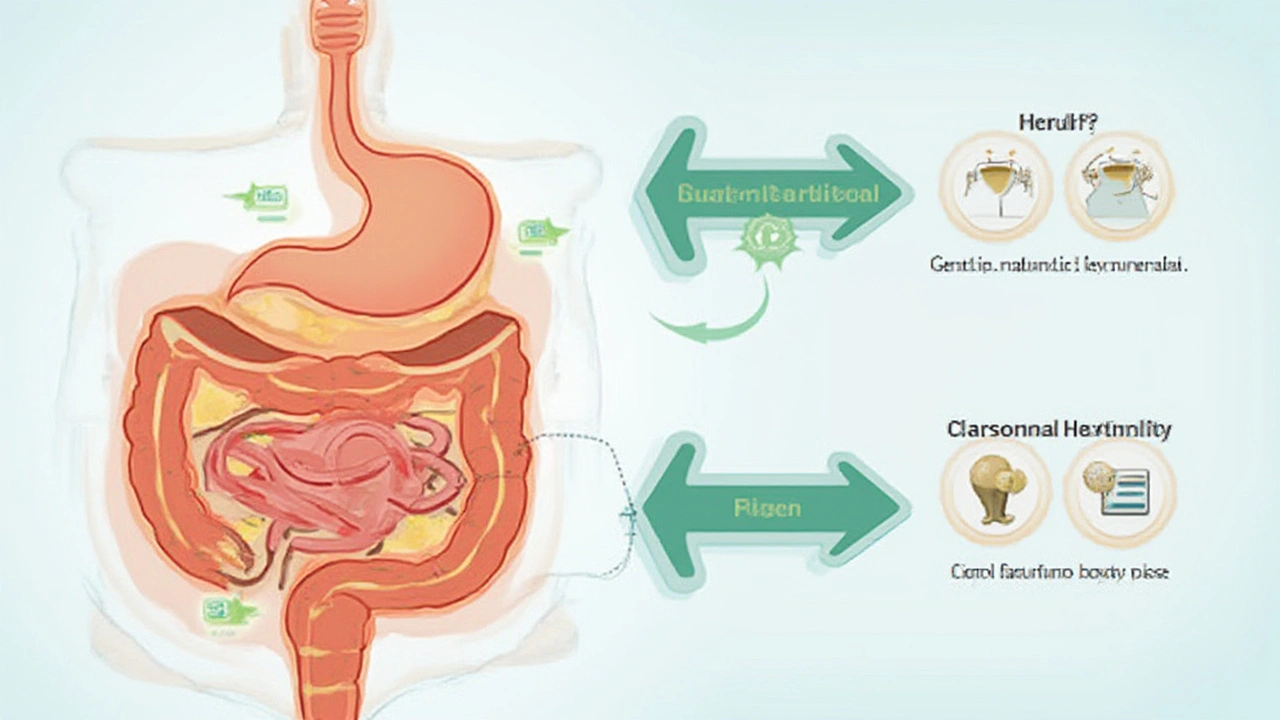Forget what you’ve heard about castor beans being just a garden curiosity or the source of that old-fashioned bottle of castor oil stashed in your grandmother’s medicine cabinet. In the last decade, castor bean’s reputation has shifted, and now, it’s not just for relieving the occasional constipation. The seeds behind this tough little plant are being looked at in labs and wellness circles for their unique blend of fatty acids, antioxidants, and immune-boosting properties. The world’s waking up to what natural healers have claimed for centuries: castor bean, when used wisely, packs a wellness punch that’s hard to beat. If you think all oils are created equal, you’re in for a surprise.
What Exactly is Castor Bean? Meet Your Ancient Healing Friend
Castor bean, scientifically named Ricinus communis, is more than a weed you’d brush past. It’s a striking plant, sometimes called the Palma Christi, and it grows in tropical and subtropical regions across the globe. Those spiky, glossy seeds are the source of castor oil—a thick, slightly sticky oil used in medicine, beauty routines, and even engine grease. Historical records take us back to ancient Egypt, where pharaohs used castor oil as a skin balm, and even to light lamps in their tombs. The plant’s origins run as deep as the Nile, but today, India produces most of the world’s castor beans. People now are discovering that this age-old remedy does more than just grease gears; it’s good for greasing your joints and easing digestive woes.
The castor bean contains a potent compound called ricinoleic acid—that’s the all-star ingredient behind many of its benefits. The key is to remember: raw castor beans are toxic, but properly processed oil keeps all the good stuff without the risk, so never DIY or eat the seeds directly. Modern supplements and topical oils use filtered, cold-pressed versions, so you get the wellness perks without the dangers. Recent market research from 2023 showed a 35% increase in castor oil supplement sales, hinting that the old-school remedy is seeing a real comeback, especially among people seeking plant-based solutions for their ailments.
But let’s be honest—many people just know castor oil for its famous use as a laxative. But research now links it to a lot more—healing minor wounds, boosting skin hydration, even helping with hair thickness and scalp health. Curious if this oil can do more than unclog your system? You’re about to find out just how deep the castor bean story goes.
The Proven Health Benefits: From Digestive Support To Skin’s Best Friend
Let’s start with science and real world results—castor oil’s main claim to fame is digestive support. Its active ingredient, ricinoleic acid, acts directly on the smooth muscle lining your intestines to help get things moving. A 2021 Japanese study found that just one dose of pharmaceutical grade castor oil relieved moderate constipation in 89% of participants within six hours. It’s gentler than harsh chemical laxatives, and people regularly report less bloating and cramping. Just a reminder, though—more isn’t always better. If you use it, stick to the dosage on your supplement label or doctor’s advice to avoid discomfort.
But castor bean doesn’t stop at your stomach. It’s loaded with antioxidants, which help neutralize free radicals—the unstable molecules that cause cell damage and speed up aging. A 2022 Brazilian clinical review highlighted castor oil's effectiveness in reducing inflammation, both when taken as a supplement and used on the skin. People with chronic joint stiffness or arthritis often use castor oil packs (a cloth soaked in oil, placed on the affected area) to ease aches. Some even combine it with gentle heat to amplify the soothing effects. Reviews show consistent improvements after two weeks of nightly use for minor joint and muscle pains.
And here’s a tip you won’t find on most beauty blogs: castor oil is a powerhouse for skin hydration and scalp care. It’s especially rich in vitamin E and omega-9 fatty acids, which feed your skin’s barrier and lock in moisture. You’ll spot castor oil in the ingredient list of fancy serums, lip balms, and even eyelash growth products for this reason. Doctors point out that it works for eczema, minor abrasions, and as a makeup remover—just check that you’re not allergic on a small patch of skin before slathering it on. For the hair obsessed, massaging a few drops into your scalp can help with dry skin flakes and may support hair regrowth in spots that look a little thin. The thick texture can be a mess if you dump it all over your locks, so keep it light and targeted.
All told, what started as a home remedy for tummy trouble now stands as a legit player in the field of holistic health. From inflammation support to beauty aid, clinical and anecdotal evidence is stacking up fast.

How to Use Castor Bean Supplements Safely: Dosage, Risks, and Pro Tips
Any supplement can go from helpful to harmful if you don’t use it right—and castor bean is no different. Be aware, the unprocessed seed is highly toxic because of the compound ricin, but no, you won’t find ricin in the commercial supplements lining health store shelves. Those are strictly filtered and cold-pressed, so you’re dealing with a safe, food-grade oil or a capsule made for internal use. But don’t take that as a green light to overdo it. More is not better, especially with anything as potent as castor oil.
If you’re thinking of using castor oil to support digestion, most supplement brands recommend 1–2 teaspoons per dose for adults. For capsules, you’ll usually see a suggested dosage of 500–1000 mg daily. Always start low to see how your system reacts. Ingesting more than 2 tablespoons of castor oil at once can trigger pretty dramatic intestinal action—think cramping, diarrhea, or nausea. So, if you decide to try castor oil as a supplement, less really is more, and always read the label for exact instructions.
Topically, castor oil is safe for most people, but some get rashes or mild itching, especially if they pile it on thick. A 2023 dermatology review said that about 5% of people tested had a mild sensitivity, so it’s smart to rub a tiny drop into your forearm and wait a day before using it on your face, scalp, or large skin areas. Pregnant and breastfeeding women should skip the supplement and oil unless their doctor says otherwise, because castor oil’s strong action on muscles could trigger contractions.
And please, keep the DIY adventures in your kitchen, not with castor plants. The raw beans and leaves are seriously poisonous if chewed—childproof every bottle and don’t keep decorative plants where kids or pets might get curious.
| Product | Safe Dosage | Primary Benefit | Warning |
|---|---|---|---|
| Castor Oil (internal) | 1–2 tsp / day | Digestive support | Don't exceed 2 tbsp |
| Castor Oil (topical) | Few drops on skin | Skin, hair hydration | Patch test first |
| Capsules | 500–1000 mg / day | Anti-inflammatory | Avoid in pregnancy |
Remember, like all supplements, castor bean products work best as part of a balanced diet and not as a magic fix. Check in with your doctor before you start, especially if you have chronic health conditions or take medications that affect your gut or immune system.
Little-Known Tips, Surprising Uses & How To Pick the Best Castor Bean Supplement
Once you’ve decided to give castor bean a spot in your supplement line-up, it’s time to get smart about the picking and using process. Quality matters—look for organic, cold-pressed, and hexane-free on the label to be sure you’re getting pure oil, not a blended knockoff. Reputable brands are your best pick, especially those who provide third-party lab results on their website. Steer clear of products that don’t clearly list the ricinoleic acid content or look suspiciously cheap. If the price seems too good to be true, you’re probably getting a watered-down or lower grade oil.
What’s fascinating is how versatile castor oil truly is. Aside from the big three—digestive, skin, and hair—some people use it on cuticles to prevent splitting, rub it into dry heels and elbows, or even as a natural high-gloss wood polish. That’s right, the ancient stuff works wonders for your furniture too. In natural health circles, castor oil packs (where you soak a flannel in warm oil and wrap it in plastic) are a hot topic. Fans claim it boosts lymphatic drainage, though studies are still few and far between. Just keep in mind that while these packs are relaxing, they’re not a replacement for medical treatment.
For hair, try mixing a few drops of castor oil into your favorite conditioner or dabbing it directly onto thinning patches before bed. If your brows look sparse, a tiny slick of oil on a clean spoolie brush applied nightly can encourage fuller growth over time. And if your lips are chronically dry, a pea-sized dab will leave them soft with none of that waxy aftertaste from commercial balms.
If you’re looking to ramp up the anti-inflammatory benefits, add a few drops of castor oil to your favorite hand cream. For those with cracked feet from endless summer sandals, a nightly dab before slipping on socks works wonders. Just don’t slather your whole face in oil if you’re acne-prone—spot treatments are the way to go. And don’t forget, storing your castor oil in a dark cupboard away from heat will preserve its shelf life and keep it fresher for longer.
If you like playing amateur scientist, keep a wellness journal to track your progress—whether you’re noticing smoother skin, easier mornings in the bathroom, or less joint creakiness. The proof is in how your body responds, and with a little patience and smart use, castor bean could be the low-cost, natural upgrade your wellness routine’s been missing all along.


10 Comments
Lynn Kline
Oh wow, castor bean supplements! I've always been fascinated by natural solutions that carry a ton of benefits, and this post really shines a light on some serious potential here!!
I've heard that they can help a lot with digestive health and even support hair growth — which sounds absolutely amazing because who doesn't want healthier digestion and fabulous hair, right?!?
But the key thing that stands out is the emphasis on safe use, because let's be real, you gotta be careful with supplements, especially the ones that pack such a punch.
It would be so helpful to know what precautions we should take before diving into castor bean supplements, especially regarding doses and any possible side effects!
This is a fantastic start; I’d love to learn more about specific ways to incorporate this supplement into a daily routine safely!
Jessica Taranto
This topic about castor bean supplements definitely piques my curiosity!
From what the post shares, it sounds like these supplements could be a game changer for digestive issues and hair growth support.
I am wondering though if anyone has insights into how it compares with other natural supplements in terms of effectiveness and safety?
Also, are there particular groups of people who absolutely should avoid castor bean supplements due to allergies or health conditions?
I totally agree that scientific backing is important, but it would be great to see more detailed studies and guidelines before we embrace these fully.
I'm intrigued by the safety tips mentioned — any chance someone can elaborate on what the safest usage looks like on a day-to-day basis?
janvi patel
Honestly, I’m a bit skeptical about this whole castor bean supplement hype.
Yes, it might have benefits but the risks always seem downplayed in posts like these.
We’ve all seen how people jump on trends without fully understanding the possible consequences, especially when it comes to something as potent as castor beans.
Are we really sure that these supposed health benefits have strong enough evidence supporting them?
Also, the post mentions safe use, but that’s vague — what does 'safe' even mean in this context?
People could easily misuse it and end up harming their digestive systems or worse.
Sometimes it pays to be cautious rather than grabbing the latest supplement craze.
Patrick Vande Ven
From a more analytical standpoint, when considering castor bean supplements, the key lies in the pharmacologically active component — ricinoleic acid.
This substance is reputed to aid gastrointestinal motility, which indeed supports digestion, but dosage and formulation make a substantial difference in efficacy and safety.
Moreover, any erroneous ingestion of improperly processed castor beans can lead to ricin poisoning, a profoundly dangerous condition.
The post's allusion to safety is prudent, yet it should be explicitly noted that self-dosing could prove perilous without proper medical consultation.
Furthermore, research into hair growth potential is currently less robust compared to the gastrointestinal benefits.
Hence, a critical and cautious approach to any claims about castor bean supplementation is strongly advised.
Rin Jan
Okay, I just can't stay quiet on this because it’s so important — folks need to stop blindly trusting everything they hear about supplements, even when they seem natural or ‘miraculous’.
Castor beans? Yeah, they have benefits, sure. But there’s a dark side here people overlook.
We live in an age overloaded with health trends, and it's critical to see this for what it is — a double-edged sword. People need proper guidance from doctors, not just glossy online posts.
The fact that this post points to digestive help and hair growth makes me wonder if everyone's thinking clearly about the possibility of adverse effects.
Natural doesn’t always mean safe — remember that, please.
akash chaudhary
Let me cut through the nonsense here: ricin is in castor beans, and if you don't know what you're doing, you WILL pay for it.
This post barely scratches the surface. It’s irresponsible to talk about ‘supplements’ and ‘benefits’ without highlighting the toxicity potential of castor beans itself.
If someone thinks popped a castor bean supplement one day and cure all their digestive or hair problems, they are deluded or risking serious harm.
Also, the idea that internal use is universally safe is false; there are strict regulatory limits and necessary processing protocols.
Anyone planning to experiment blindfolded with castor bean supplements is begging for trouble — word.
So please, people, do some heavy research and don’t buy hype over hard facts.
Adele Joablife
I appreciate the article's enthusiasm, but it’s crucial to maintain healthy skepticism when it comes to supplements like these.
Claims like improving hair growth always get my antennae up because results vary widely among individuals.
Plus, the way these supplements are processed and the quality control practiced really affect outcomes and safety.
It’s tempting to try everything that promises quick health wins, but we need to respect that not all natural alternatives fit everyone equally.
Consumers should definitely consult healthcare professionals before starting any castor bean supplement regime.
Ultimately, being informed and cautious outweighs jumping on bandwagons that aren’t yet foolproof.
Mandy Mehalko
This looks like a really interesting supplement! I’ve heard about castor oil, but castor bean supplements specifically? That’s a twist!
It’s great that the post highlights both health benefits and safe use — such a key combo because sometimes people forget how important it is to be cautious with natural products too.
Personally, I’m curious if anyone here has tried these supplements and what their experience was like.
Did they notice improvements in digestion or hair growth as suggested? Was there any weird side effects or downsides?
I love learning from others' personal journeys because that often tells more than just science alone.
Would be awesome to hear some real-life stories or practical tips for beginners!
kenneth strachan
Hmmm, I find this whole fascination with castor bean supplements kinda overblown, personally.
Sure, there might be some benefits, but are they really that groundbreaking or just another fluffy internet trend?
Sometimes it feels like we’re chasing magical pills instead of focusing on balanced diets and good old exercise.
And let's be real, the fact that castor beans contain toxins isn’t exactly the safest bright spot in this picture.
I’m all for natural health, but caution over hype — or we end up in another supplement gold rush that fizzles out.
Anyone else feel this way? It’s like some buzzwords create a frenzy but leave little behind.
Bryan Kopp
Honestly, I think this supplement might have some regional appeal, but from my view, it’s too risky to promote widely without fully understanding its origins and manufacturing.
No matter the benefits touted, if the origin isn’t verified or regulated, you’re gambling with your health.
We should also consider how it fits with broader wellness routines and not treat it like a cure-all.
Plus, some supplements have hidden additives which can be problematic for certain users.
So, while the idea sounds promising, I urge everyone to be skeptical and thoroughly vet the products before use.
Your health is too valuable to gamble carelessly.